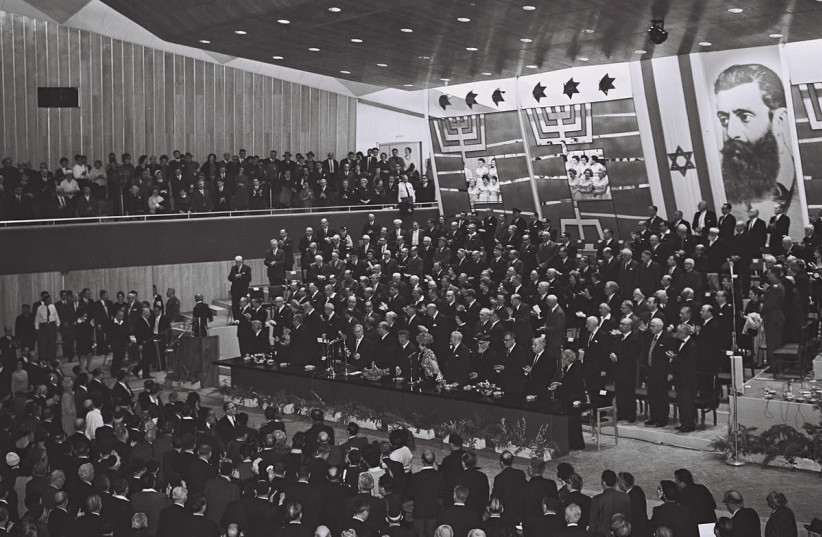I am excited to be participating in a special event to commemorate the 125th anniversary of the First Zionist Congress, which was held in Basel, Switzerland, from August 29 to August 31, 1897. Afterward, Theodor Herzl famously said, “At Basel, I founded the Jewish State. If I said this out loud today, I would be greeted by universal laughter. In five years perhaps, and certainly, in fifty years, everyone will perceive it.”
Herzl’s statement has passed into legend, but fewer remember that the First Zionist Congress drafted the first manifesto of the Zionist movement. This called for the promotion of Jewish settlement in Palestine; the federation of Jews into groups around the world; the strengthening of Jewish feeling and consciousness; and steps to achieve governmental grants to help achieve the Zionist vision.
“At Basel, I founded the Jewish State. If I said this out loud today, I would be greeted by universal laughter. In five years perhaps, and certainly in fifty years, everyone will perceive it.”
Theodor Herzl
The Basel Program
The Basel Program was replaced, in 1951, by the Jerusalem Program, which reflected the shift in Zionist priorities now that the State of Israel had already been established. The new focus was on encouraging Aliyah and the absorption of olim; supporting pioneers and encouraging private capital investment; fostering Jewish consciousness and mobilizing public opinion for Israel and Zionism; and the maintenance and defense of Jewish rights. This program was revised again, in 2004.

Yet today, 125 years after Basel, many feel that the Zionist enterprise has already achieved its aims. After all, there is now a thriving, secure and democratic Jewish state. Because of this, there is a danger that the 125th anniversary might be viewed as just a birthday, an opportunity for mere sentimentality and shared celebration. This would be unfortunate. Now, more than ever, we need to reassert and reimagine Zionist principles for today’s world.
We went through a similar position of reconsidering orthodoxies and looking to the future when building the Neishlos Foundation, which supports major initiatives in Israel, Australia and the Abraham Accords countries. Traditionally philanthropy has relied on major donors writing big checks, while neglecting the importance of sustainability. We have worked to move beyond this traditional model by using the power of the collective to amplify the impact of major donations; even more important is creating initiatives that can have a long-term, sustainable impact that empowers communities and can lead to tangible change. By building these initiatives, we aim to transform bystanders into “upstanders” who take positive action against discrimination in all forms and make a difference, whenever possible.
In considering the future of Zionism 125 years after Basel, we need to consider recent changes in the Jewish and wider world. Firstly, while the age of mass aliyot may have come to an end, there are still millions of Jews around the world for whom Israel is the center of their religious and cultural existence. I am currently based in the UAE, where I see the passion for Israel among the small (but growing) Jewish community here. Even if its members won’t make Aliyah, it is vital that we harness their passion.
Secondly, the Abraham Accords are the most significant diplomatic breakthrough for Israel since the peace treaties with Jordan and Egypt. I see that every day here in the UAE. Expanding the circle of peace and cooperation is a vital strategic interest that concerns not just governments but also civil society figures, businesspeople, and private citizens. Thirdly, Israel has a vital role to play in bringing innovation and technology to the rest of the world. I have worked extensively in the developing world, and I know the high esteem with which the Start-Up Nation is viewed by so many. Finally, education must continue to be central in everything that we do.
I have had the privilege of being actively involved in Holocaust education through a variety of projects, but this is only one piece of the puzzle. The Holocaust is a very good argument for Israel’s existence, but it is not the reason that Israel exists, and it is vital that education provides positive reasons for Jewish identity and collective belonging. Because of this, the Neishlos Foundation is increasingly active in the field of Jewish continuity.
Jewish community, peace, innovation and education should be the bedrock of a revived Zionist program. Change is the law: only by being alert to the ever-shifting landscape will we be able to ensure that Zionism remains as significant in the twenty-first century as it was in the twentieth. Zionism didn’t finish with the realization of Herzl’s prophecy: the work will always continue – to paraphrase Pirkei Avot, while it may not be our duty to finish the work, we are not at liberty to neglect it.
